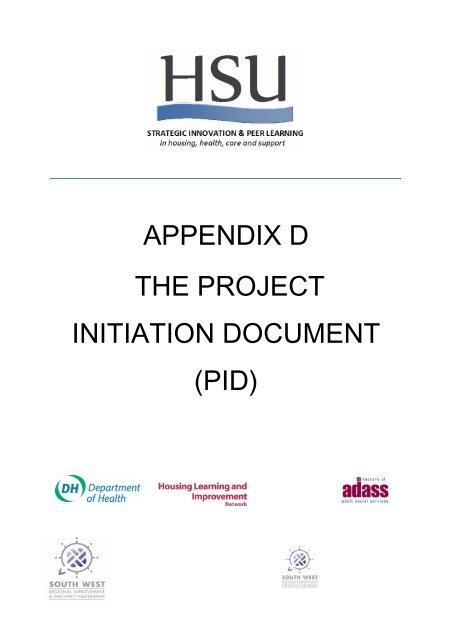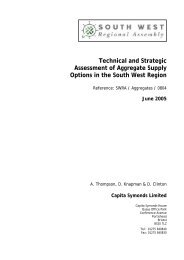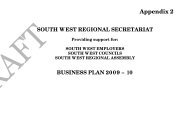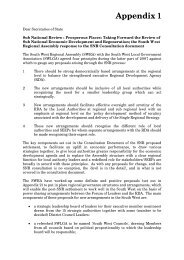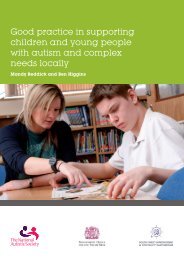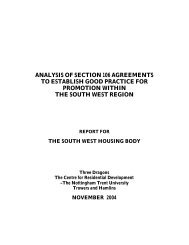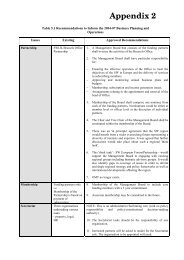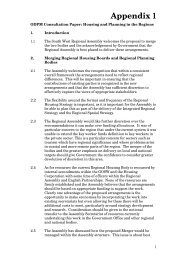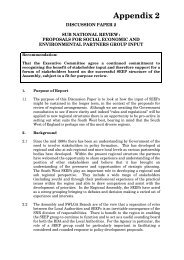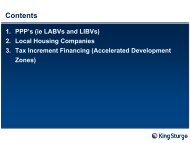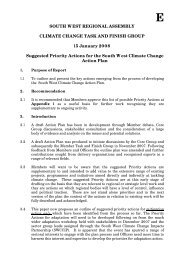The Project Initiation Document (PID) - South West Councils
The Project Initiation Document (PID) - South West Councils
The Project Initiation Document (PID) - South West Councils
Create successful ePaper yourself
Turn your PDF publications into a flip-book with our unique Google optimized e-Paper software.
APPENDIX DTHE PROJECTINITIATION DOCUMENT(<strong>PID</strong>)
PROJECT INITIATION DOCUMENT<strong>Project</strong> TitleHousing Support Unit - planning for the housing andsupport needs of an ageing and vulnerable populationDelivery PlanRIEP Housing Delivery Plan Sub Group - Meeting thehousing needs of older people, making better use of theexisting housing stock, supporting and promoting thestrategic housing roleAccountable/Lead Authority (and otherpartners)DHSW, SW Joint ImprovementPartnership (Lead DASS is JudithGeddes Bournemouth CC), SW HousingLIN, RIEP Housing Delivery Plan <strong>Project</strong>GroupStart date of project Sept 09Anticipated enddate of projectMarch 2011Overall budget detail£50k JIP (prevention & early intervention)£60k DHSW£40K RIEP (Housing Group)<strong>Project</strong> ManagerPaul Jones (DHSW)Responsible SWRIEP ProgrammeManagerMarion Britton
Section A: <strong>Project</strong> Summary<strong>The</strong> overall aim is to support every LA area to have an informed plan for achieving better housingoptions for older people (including those that are vulnerable) nb - the scope of this projectintentionally covers older and vulnerable people to ensure that synergies with other projects canbe explored (particularly those around delivery of Public Service Agreement (PSA) 16 - increasethe proportion of socially excluded adults in settled accommodation).<strong>The</strong> Unit will complement existing improvement and efficiency programmes, prevent duplication inregional support activity, and supply the following to local authorities in the region:tailored information and intelligence on existing initiatives and experiencedetailed advice, guidance and support for strategy development and;other capacity building activities for local authorities<strong>The</strong> aims of the Unit are threefold:1. To support the Transformation of Adult Social Care* i.e.That every council has a clear strategy, jointly agreed with health, for how it willshift some investment from reactive provision towards preventative andenabling/rehabilitative interventions for 2010/11. Agreements should be in placewith health to share the risks and benefits to the 'whole system'.That councils and PCTs have commissioning strategies that address the futureneeds of their local population and have been subject to development with allstakeholders especially service users and carers; providers and third sectororganisations in their areas. <strong>The</strong>se commissioning strategies take account of thepriorities identified through their JSNAsDeveloping approaches that will demonstrate an effective use of the availableresources and help to meet efficiency targets and the Total Place agenda2. To enable local authorities to take the findings of the Housing LIN’s ‘Putting Older Peoplein the <strong>South</strong> <strong>West</strong>’ report forward, in order to have housing and support services which arefit for the future and in line with the rising aspirations of the next generation as set out inPSA 17 (promote greater independence and wellbeing in later life).3. To support local authorities and their strategic partners to increase the quality and range ofaccommodation options for older people with mental health needs and learning disabilities,in line with the National Indicators which make up the housing-related priorities set out inPSA 16.Section B: <strong>Project</strong> Detail<strong>Project</strong> scope:<strong>The</strong> overall aim is to support every LA area to have an informed plan for achieving better housingoptions for older and vulnerable people. <strong>The</strong> Housing Support Unit will help authorities to develop andimplement strategies to:-o Reduce the use of residential care by developing new extra care housing (ECH) orother specialist housing schemes
o Remodel and make better use of existing housing, ECH or sheltered stock, orresidential homeso Develop core and cluster provisiono Develop new models of housing support e.g. a “virtual” ECH model by investment intelecare and adaptations for people remaining in their own homesOutcomes sought:o Informed strategies for delivering better housing options for older people in the SWo Increased choice, independence and wellbeing for older and vulnerable people inthe SWo Raised awareness of the need to plan strategically for the current and future needsof the ageing populationMeasured through:o Number of authorities with status reports and recommendations on the way forwardto deliver improved housing options for older, vulnerable people.o Performance against National Indicators measuring achievement of independenceand choice in later lifeo Reduced reliance and expenditure on residential careo Evaluation of housing strategies across the region<strong>Project</strong> Outputs:<strong>The</strong> anticipated outputs expected from the service are: For each local authority supported to have in place strategies and business plans fortransferring resources from existing residential and nursing provision, and underused wardensupported accommodation to new models of extra care and supported housing, telecare orother identified options. For the overall usage of residential and nursing homes to reduce across the <strong>South</strong> <strong>West</strong>region, with a commensurate increase in the range and number of appropriate mainstream andspecialist housing options and support services to meet the needs and aspirations of theregion’s older and vulnerable people. For local authorities and their strategic partners to identify and take the key steps necessary to,at the very least, develop proposals for future provision of housing and care in their area (thiscould include the development of an ECH scheme for example). For local authorities and their partners to be in a position to prepare a bid for grant fundingfrom the Homes and Communities Agency, and / or other sources of revenue and capitalfunding that can help to achieve PSA 16/17 targets.Rationale for funding application:Funding has been allocated to this project to provide the necessary capacity, support andchallenge to LAs to deliver the outcomes sought. <strong>The</strong> project aligns well with the <strong>South</strong> <strong>West</strong>RIEP's Housing Delivery Plan objectives.Key milestonesTask Output (s) MilestoneConsult, refine and agree the HSU proposal, Agreed <strong>PID</strong> and funding Sept 09governance and fundingMap & record existing activity & the progressmade by other agencies & LAs (regional &Reference library and examples ofbest practice, tools and supportingDecember2009national). Aligned to SW Housing LIN work contracts/agreements etc.Map existing & potential funding steams Current and potential funding Dec 09availableDevelop a simple core presentation to set outthe key messages, context & the need foraction.Develop & agree methodology for prioritisingLAs for support, referencing market surveyresponsesavailableCore presentation for use withmembers, SMT & otherstakeholdersAgreed prioritisation of LAs forsupportEnd Oct 09End Oct 09
Task Output (s) MilestoneSchedule of visits (up to 5 LAs?), Nov/Decwho take up the HSU support 09offer. Specifications for support &funding requiredContact priority LAs and scope the supportrequired, agree commitment and plan thedetailed support and funding requiredVisit other SW LAs to baseline progress,good practice and learning.Evaluation & challenge report onprogress made, learning pointsidentifiedEnd March2010Procure required support for identified LAs Call off list for support required Dec 09On site work with identified priority LAs Delivery of support package TBCspecifiedEvaluate progress and share lessons learntregionallyEvaluation report and learningmaterialsTBCSummary of the benefits: Benchmarking of SW LA progress on commissioning of housing provision for older,vulnerable people. Linked to work on delivery of 'Total Place'. Library of good practice, learning and accompanying documentation Up to 5 LAs with agreed plan/strategy for delivering better housing options for older,vulnerable people Reductions in use of residential care and reallocation of funding to preventative lower costprovision (or efficiency savings) Increased awareness of the issues and options available to transform housing provisionScalability/repeatability:<strong>The</strong> tools identified, developed and utilised will be available to all SW LAs via the LIN.<strong>The</strong> project could involve utilising funding to look at commissioning better housing options for olderpeople in context of health, housing and social care interactions and pathways as part of the TotalPlace work funded by the RIEP. Particularly as some sub regional TP work will major on theefficiencies that can be driven between health, housing and social care.Sustaining the change:<strong>The</strong> prioritisation of LAs for support and the benchmarking of SW progress will provide the basisfrom which delivery against the Transformation of Adult Social Care milestones* can be judgedProgress will be assessed by the broader work of the JIP in overseeing SW progress against thesemilestones.
Section C: Resources and GovernanceSummary of Costs:£150k has been allocated to the project which to be utilised in the following manner:Task Who Amount<strong>Project</strong> management costs includingmapping of activity, funding and recordingprogress across SW. Establishing libraryof supporting documents and goodSW Housing LINpracticeScoping work with SW LAs, specificationof support and funding requiredDelivery of specific support identifiedEvaluation and dissemination of learningSW Housing LINJames Cawley (WiltshireCouncil)Consultancy support viacall off listSW Housing LINSummary of Funding:<strong>The</strong> funding from partners is summarised above. LA contributions to the scheme of workwill be negotiated at the time the project specification is agreed.<strong>Project</strong> Team (responsibilities and lines of authority): <strong>The</strong> work of the HSU will be delivered by a <strong>Project</strong> Team comprised ofA JIP/ADASS <strong>Project</strong> lead (James Cawley, Wiltshire Council) working approx25 days per annum (pro rata monthly) <strong>The</strong> <strong>South</strong> <strong>West</strong> Regional Lead for the Housing LIN (Pat Palmer) andprogramme support who would be commissioned for 150 days (approx 3 daysper week)An additional team of consultants and IPC staff who would between themprovide a skills matrix across housing, health and social care, and who wouldbe employed under ‘call off’ arrangements according to the nature of the workidentified by the project team in consultation with individual authorities.In addition, the project will link and co-ordinate with the existing JIP funded learningsets commissioned from IPC to promote the development of more integratedapproaches to housing, care and support in the region.Governance<strong>The</strong> Housing Support Unit will be governed by a task and finish Steering Group to beestablished consisting of representation from ADASS, SW RIEP (Housing Delivery Plan<strong>Project</strong> Group), Deputy Regional Director for Social Care (DH SW), GOSW and the SWHousing LIN
Section D: Risk Assessment and Exit StrategyKey Risks Mitigation StatusEngaging high levelcommitment and buy-inregionally and locallyCommunications strategy andpresentation to key members andother stakeholders. ADASSsponsorship and engagement withproject. Work with regionalstakeholders - GOSW and HCAAmberScoping work, capacity andtimescaleTransparency overallocation of resources andpriority for supportPractical delivery of thework, uncertainty over whatthis looks like, procurementdifficultiesTimescale for spendingresources allocatedReview early market survey returns.Identification of priority LAs, workthrough the list until willing partnersidentified.Agree methodology and prioritylisting with Steering GroupmembersInvestigate existing call off lists thatmight be able to be used - RIEP,Regional Housing Group, HCA?Investigate timeframe and carryforward arrangementsAmberAmber/GreenAmber GreenGreen


